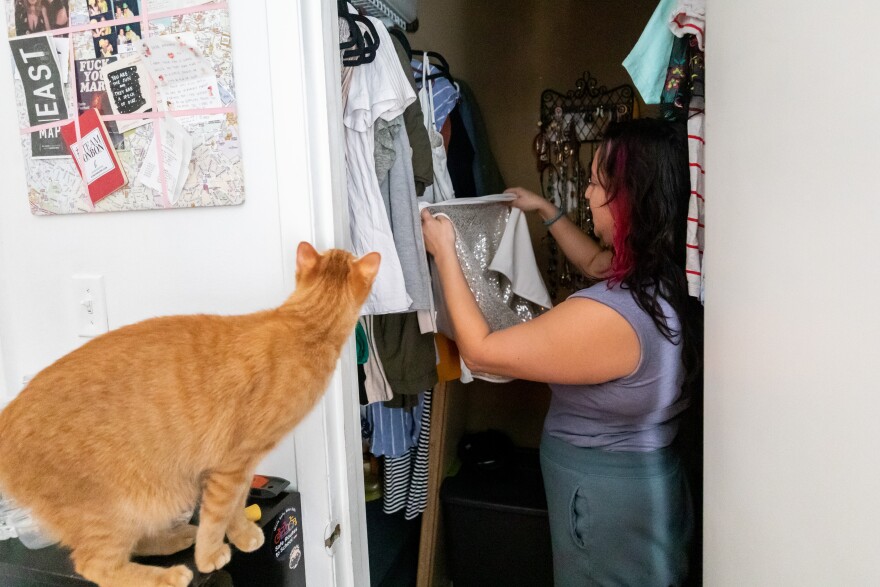Part 2 in a series on abortion in Texas. Find the rest of the series here.
Among the dating apps Amanda Phillips has used, she prefers Hinge. The people, she says, seem nicer.
Like many dating apps, Hinge lets users upload photos, answer prompts ("My simple pleasures …," "I get myself out of a funk by …") and comment on others’ profiles in the hopes of matching, chatting and eventually meeting in person.
It’s a practice in curation; you present a certain image of yourself and hope your ideal partner takes the bait. Phillips’ profile consists of a couple selfies, a photo outdoors with a friend, a shot of her multicolored hair, plus her non-negotiables: bodily autonomy, Black Lives Matter and her 7-year-old son.
“My brand is cute, progressive single mom in Austin, Texas,” Phillips, 28, said.
This is the image Phillips projects of herself, one of a complex person. But she said she feels the state, which now outlaws nearly all abortions, only sees her as one thing: a person whose worth depends on her ability to reproduce. Living under this abortion ban has prompted Phillips to set the bar much higher when it comes to who she dates, even when she’s dating casually.
“When I'm dating a man, I have to ask myself, am I worth more than $10,000 to them?” she said.
Phillips is referring to Senate Bill 8, the near-total ban on abortions that went into effect in Texas last year. The law allows citizens to sue someone who helped or encouraged a woman get an abortion. If their lawsuit is successful, they can claim up to $10,000.
While SB 8 does not allow people to sue the person seeking an abortion, Phillips said it still feels like a bounty on her body.
“Would this man rape me for $10,000?” she said. If Phillips got pregnant after being raped and sought an abortion, she explained, under SB 8 a man could sue anyone who helped her. “I honestly haven't found many men that I trust who put me above that imaginary bounty.”
Abortion laws became even more restrictive after the U.S. Supreme Court overturned Roe v. Wade this summer. That move put in place Texas' so-called "trigger law," which prohibits abortion except in the case that a woman's life is endangered.
As a result of the bans, some Texans say they’re having deeper conversations earlier on in dating — not just about contraception and potential pregnancy, but about values. The result can be increased intimacy, but also exhaustion, particularly among women.
'That’s a really big conversation to have'
Annie Fichtner remembers a conversation she had this summer with a guy she had been dating for about a month. They were talking about how often he used condoms when having sex.
"'Yeah, I'll use it if the woman asks me to,’” she remembers him saying.
"I was like, ‘Well, you should be using it anyway for your own protection, buddy,'” she said.
"Now it's not just a conversation around, ‘Did you bring a condom?’ It's bringing up conversations of, ‘Would you support me financially or emotionally if I needed to do something?'"Madison Wise, therapist
Fichtner, 30, used to have an intrauterine device, more commonly known as an IUD. The small, T-shaped device is inserted into a person's uterus and blocks sperm by either releasing hormones or copper into the body.
“The experience itself is quite painful, it's quite invasive,” Fichtner said. “But it was worth it to me to not have to worry anymore. Not to have to worry about taking a pill every day and then not to have to worry about having access to birth control.”
But she had her IUD removed last year after experiencing various side effects: abdominal pain as a result of ovarian cysts, plus constant heavy periods. Without some form of long-lasting birth control, Fichtner has been using diaphragms and condoms and tracking her fertility.
So, when the person she was dating said he didn’t always use condoms, the conversation moved to sexually transmitted infections and then contraception and then: What would happen if she were to get pregnant?
“If anything were to happen, what would you do?” Fichtner remembers asking.
Roe v. Wade had just been overturned and most abortions had already been illegal in Texas for about a year. She hadn’t necessarily thought about having this conversation until she found herself without access to abortion.
“It's going to be quite the process if I need to [get an abortion]. Especially financially. Are you prepared to help out with that?” she asked him.
Some women have been traveling across the country to receive abortions, incurring the cost of flights and hotel rooms, not to mention the procedure. One patient who traveled from Texas to Minnesota paid more than $1,300, according to The New York Times.
Madison Wise works as a licensed therapist with many people in their 20s and 30s who are dating. She said a ban on abortions may force someone to communicate about sex earlier — and on a deeper level.
“Now it's not just a conversation around, ‘Did you bring a condom?’ It's bringing up conversations of, ‘Would you support me financially or emotionally if I needed to do something?’" she said. "That's a really big conversation to have."
And it’s a conversation, Wise said, that often falls to women to initiate. “It’s exhausting,” she said.
One result, Wise said, is that women may be dating more intentionally. They may be vetting peoples’ values and politics when they first meet them, as opposed to weeks or months into knowing someone.
“It might be a little bit of a higher turnover rate of first dates that just don't go anywhere, which is not a terrible thing in the long run,” Wise said. “You can meet a more respectful partner quicker.”
Carrying the weight
Mike Arendt has also talked about sex and contraception earlier on in dating now that abortion is illegal in Texas.
Arendt, who is going through a divorce, has been dating for several months. At 36, he has decided he doesn’t want children. So, when the Supreme Court overturned Roe, Arendt called a urologist’s office the next week to make good on a decision he’d been thinking about for years.

“I decided that it was past time to finally take my own bodily autonomy into my own hands,” Arendt said. “That's why I decided to get a vasectomy.”
Arendt, who uses dating apps, includes that he’s had a vasectomy in his profile — among perhaps less consequential facts like that he keeps his toenails trim and is a good cook. When he matches with people, he said, his vasectomy is one of the first things they comment on.
“It’s usually something like, ‘I really appreciate that you have a vasectomy,’” Arendt said. “That's usually a good entry point for conversations about shared values.”
As a dating coach based in Austin, Shaina Singh said women she works with are now, perhaps more than before, looking for someone willing to shoulder the burden of having these hard conversations.
“A lot of people who are able to get pregnant seem to be carrying a lot of the weight, anxiety and worry around [the abortion ban],” Singh said. She said now many of them are asking themselves: “‘Hey, why is it that I am the one who continues to carry this weight and worry?’”
This isn't the first time she's seen a shift like this in dating. After the racial justice protests in 2020, Singh said, people started to be more discerning about shared values, even when casually dating, asking questions like, "Where do you stand in terms of anti-racism and liberation? How invested are you in social justice?"
The abortion ban, she said, adds another layer. And it may even affect how people are choosing to meet.
“The people who are not using dating apps … they are meeting people through some of their friends or community,” Singh said. “Because a lot of these communities, these friend groups, these social groups tend to have some common values they are finding that they're still matching, they're still meeting.”
'It’s just exhausting'
Last weekend, Phillips planned two dates: coffee with an insurance agent whose profile included lots of gym photos, and another with an EMT who, after working a 24-hour shift, still had the energy to meet up.
These dates were with men — which has been unusual recently for Phillips, who identifies as bisexual.
“I've dated a lot more women since Roe v. Wade,” she said. “The women aren't asking me to go to their house on a first date. The women aren't arguing about birth control.”

On Friday morning, she sifted through dozens of dresses spread across two rooms in her house: a blue form-fitting one with a single strap, a red-striped one and another that was bright yellow with a cut-out below the breast bone.
“This would be [for a] fourth date, if I could find anyone to go on a fourth date with,” Phillips said, holding up the yellow dress. “This is expensive and nice. I look incredible and feel incredible in it. And, honestly, a lot of people don't deserve to see me in this.”
Phillips wasn’t sure, though, if she’d have the energy to go on dates this weekend. She was physically tired from the week, sure, but also dating as a woman living under an abortion ban can be tiring.
“At a certain point, it's just exhausting," she said. "And you're like, 'I'm just going to watch a movie and go to bed.'”




















